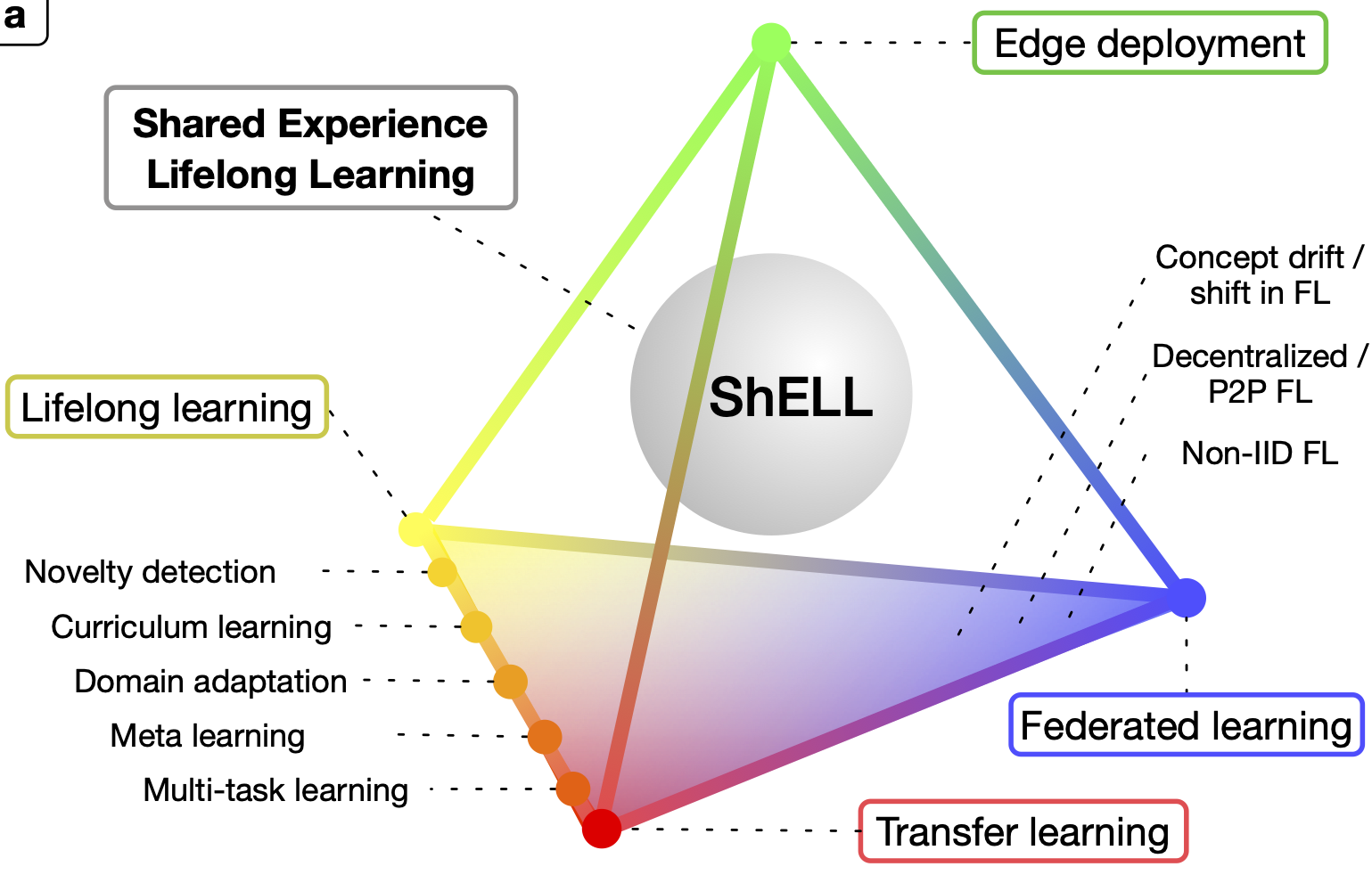Happy to share this collaborative work with exceptional colleagues on how we can build networks of always learning and knowledge-sharing AI systems. Published on Nature Machine Intelligence. Read the full article at https://rdcu.be/dB9zt


Happy to share this collaborative work with exceptional colleagues on how we can build networks of always learning and knowledge-sharing AI systems. Published on Nature Machine Intelligence. Read the full article at https://rdcu.be/dB9zt

One research associate and two funded Ph.D. positions are available at the Computer Science Department, School of Science, Loughborough University, UK, on the topics of the evolution of lifelong learning in neural networks.
Research. The aim is to develop new neuroevolution algorithms for lifelong learning. The objectives are to devise machine learning systems that autonomously adapt to changing conditions such as variation of the data distribution, variation of the problem domain or parameters, with minimal human intervention. The approach will use neuroevolution, neuromodulation, and other methodologies to continuously discover and update learning strategies, implement selective plasticity, and achieve continual learning.
For an overview of the research direction, see the paper: Born to Learn: the Inspiration, Progress and Future of Evolved Plastic Artificial Neural Networks https://www.researchgate.net/publication/315710249_Born_to_Learn_the_Inspiration_Progress_and_Future_of_Evolved_Plastic_Artificial_Neural_Networks
Application areas include a variety of automation and machine learning problems, e.g. vision, control, and robotics, with a particular focus on resilience and autonomy.
Working environment. The research associate and Ph.D. students, based at the Computer Science Department, will work in an international team with opportunities for collaboration and travel. They will have access to a number of robotic platforms such as mobile and flying robots, manufacturing robots, High Performance Computing clusters, and GPU computing. The Computer Science Department and robotics laboratories have ongoing collaborations with large industries and programs to promote start-ups.
Loughborough University is ranked 7th in the UK in the 2019 League Table Ranking http://www.thecompleteuniversityguide.co.uk/loughborough/performance ), and is located in Loughborough, a town well connected to London by a 1h20m journey by train.
Requirements.
Postdoc: A Ph.D. in Computer Science or related with a strong publication record, coding abilities, predisposition to work in a team and independence, passion for science, solid work ethics.
Ph.D. students: The ideal candidate holds (or is about to obtain) a first-class honour undergraduate/postgraduate degree (or equivalent) in Computer Science, Mathematics, Statistics, Electrical or Electronic Engineering, or has authored publications in recognised conferences/journals. Independent working skills are valued as well as the capability of working in a team. Collegiality and interpersonal skills are essential.
Excellent English language skills are also essential (see requirements here http://www.lboro.ac.uk/international/englang/index.htm)
Period and salaries.
Postdoc position: until June 2020 (with possible extension) with a competitive salary at Grade 6 (http://www.lboro.ac.uk/services/hr/benefits/pay-rewards/)
Start: as soon as possible.
Ph.D. studentships:
Scholarship: £14,777 per annum plus tuition fees at the UK/EU rate.
Start: August 2018 or shortly after.
Duration: 3 years.
Enquiries and applications. Interested candidates are invited to send preliminary enquiries to a.soltoggio@lboro.ac.uk including a CV, a university transcript of marks, a list of references, and a statement of about 300 words motivating their interest in this area of research.
It was a pleasure to work with The Conversation to explain our recent scientific work:
This is one just advertising video of the potential of the technology that we developed at Loughborough University in collaboration with ICE
Our #AI #deeplearning technology developed @LboroScience @lborouniversity in the user product TilAR by @iceagencyuk @innovateuk https://t.co/PavO1QeudQ @lboroenterprise #augmentedreality
— Andrea Soltoggio (@asoltoggio) May 29, 2018
I’m happy that I finally managed to put together a research topic for Frontiers in Neurorobotics.
http://www.frontiersin.org/Neurorobotics/researchtopics/Neural_plasticity_for_rich_and/3107
Deadline for abstract submission (12 September 2014)
Deadline for paper submission (12 January 2015)
If you are interested in contributing, please send me short email or visit the link above to submit an abstract
I submitted today my latest manuscript titled “Short-term plasticity as hypothesis testing in distal reward learning”. The manuscript is currently under peer review.
The Matlab code to reproduce the experiment is available here for download.
Update (4 April 2014)
A new version of the paper was submitted for review. Here is the updated Matlab code.